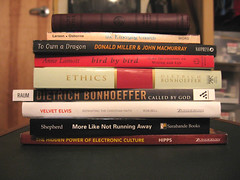My 50th anniversary edition of this influential book contains several additions compared to the Harper Torchbook paperback I started to read back in 1992. That one was a crumbling used book with an olive-green cover, yellowed pages, and tiny print. I didn't finish it. I didn't get it.
With this new edition, the editors include an introductory chapter written by Niebuhr that not only summarizes the 5 typologies that characterize orientations to the connection between "the gospel" and "the world" but also spends a profitable moment describing what typologies are and how they should be used. This brief essay provides a smooth transition into the text.
Also, James Gustafson's introductory preface nails home the importance of seeing how typologies function (something sociologists have wrested with from Max Weber's work) and the misreadings that can happen by misunderstanding their application. Martin Marty's brief introduction is also helpful.
Also, James Gustafson's introductory preface nails home the importance of seeing how typologies function (something sociologists have wrested with from Max Weber's work) and the misreadings that can happen by misunderstanding their application. Martin Marty's brief introduction is also helpful.
So, I am again reading through the book. As you can see, there are several "prefatory" materials, so you can understand how after 2 days I am finally getting to page 1!
 Image by Oberazzi via Flickr
Image by Oberazzi via Flickr
The main point I get out of my reading (let me remind you, this is all pre-page 1) is Niebuhr's outstanding observation that --
"[the use of] typology...denies the assumption that there is a single Christian ethics or a single Christian ethical principle. It assumes, on the contrary, that there are multiple principles and a large number of creative individual concretions of the Christian life."
That statement alone is worth the price of the book.
 Image by jakebouma via Flickr
Image by jakebouma via Flickr
Certainly, any actual observation of members in any local congregation would do the same.
By establishing a base of comparison, we can now look at the implications and differentiation of orientations in terms of definitions of culture, approaches to social change, rhetorical strategies for describing changes, decoding discourses and "jeremiads" of all sorts, and generally helping us think a whole lot better about the religious self in the world.
And generating better thinking about the self and the world is what I think Niebuhr wanted most from this book.




1 comment:
This really is a classic! I've read it a number of times throughout college and beyond. Worth every penny. Niebhur was way ahead of his time.
Post a Comment